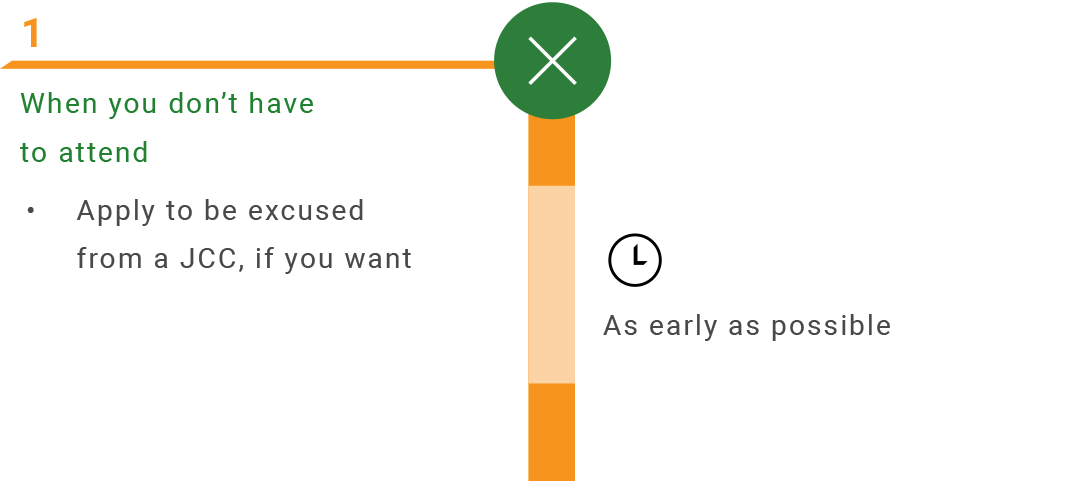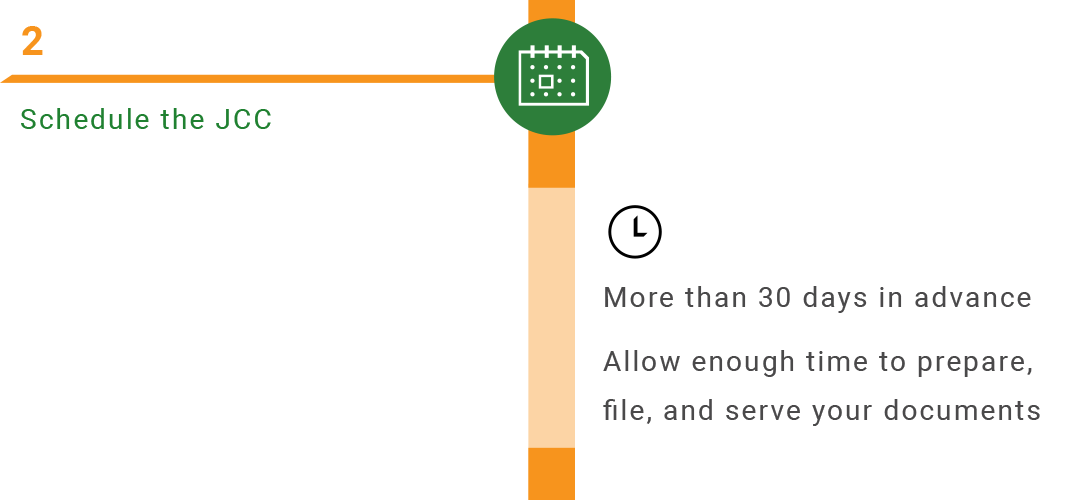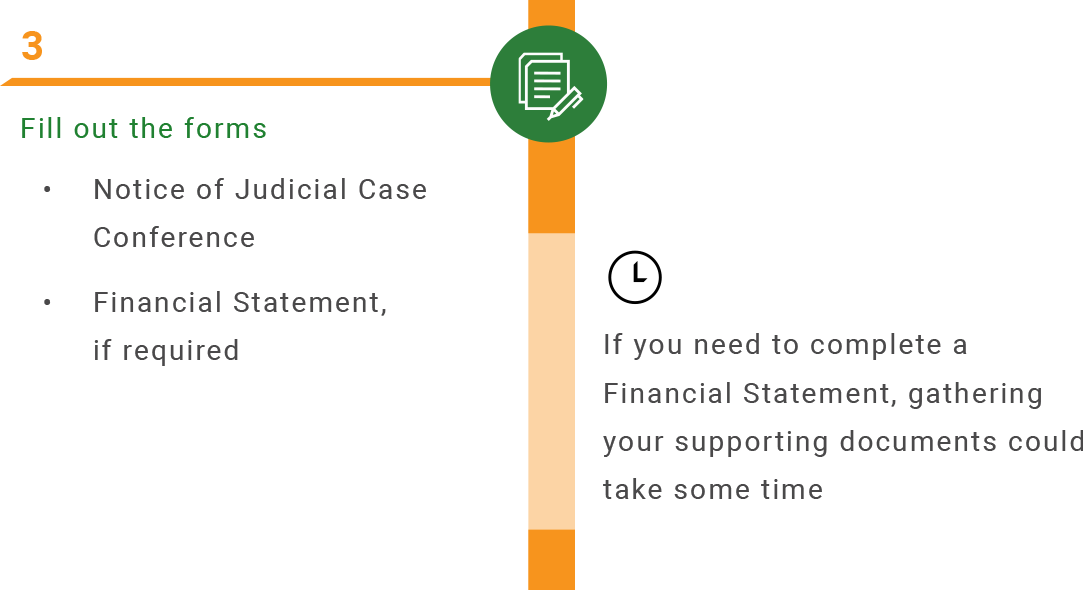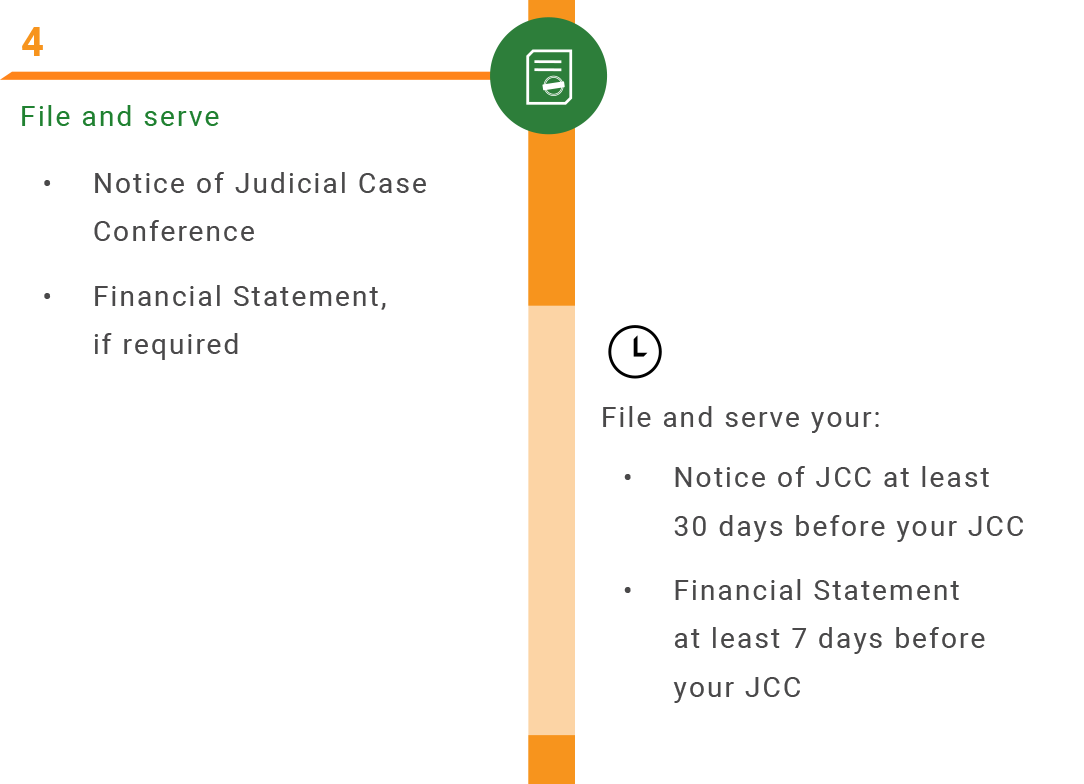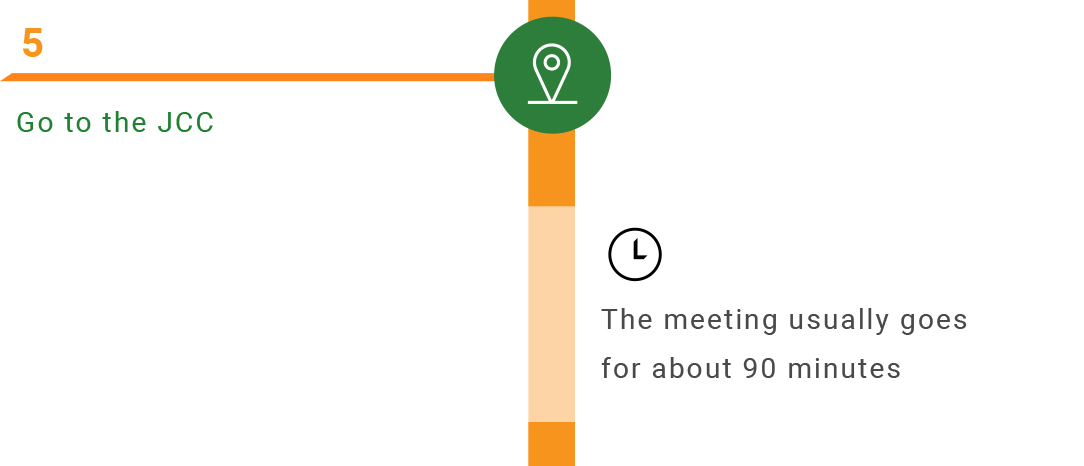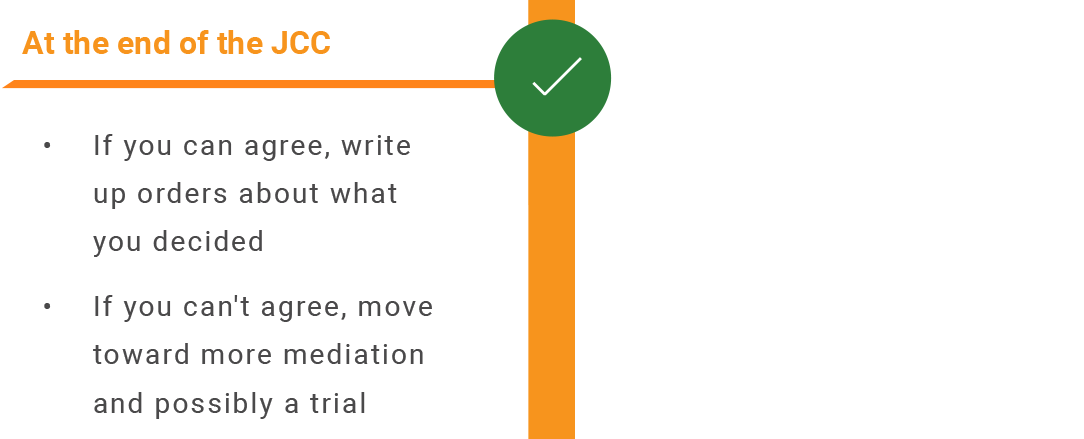Introduction
This step-by-step guide is for you if:
- you're required to have a Judicial Case Conference (JCC) as part of your application for a contested divorce, or
- you want to have a JCC to try to settle your issues before you go to court.
You're the filing party so you'll be filling out the Notice of Judicial Case Conference, filing it at the registry, and serving it on the other person.
What's a JCC?
A JCC is a confidential meeting between you, the other person involved in your case (for example, your ex-spouse), your lawyers if you have them, and a judge or master. It gives you and the other person a chance to work things out without having to go to court.
A JCC isn't required if having it could be dangerous or unfair, or if it's too soon or too late to resolve your issues. You can apply to be excused from having a JCC in the next step.
How long does the process take?
The JCC process will take at least one to two months, but could take several more if your Supreme Court registry is busy.
A JCC can help to avoid or reduce the hard feelings that can arise when you have to go to court.
When you don't have to attend
You'll need
- a Requisition General (application) (Form F18.1), if you want to apply to be excused from having a JCC.
When a JCC isn't required
Usually you must attend a Judicial Case Conference (JCC) before you can file a Notice of Application (Form F31), but there are some automatic exceptions.
You can also apply to the court to be excused from having a JCC if:
- your matter needs to be resolved quickly;
- it's too soon to have a JCC;
- it would be unfair, inappropriate, or unmanageable to have a JCC;
- it could be dangerous to your health or safety to delay your application or to require a JCC; or
- the judge or master decides it's right to excuse you.
If you don't qualify to be excused from the process, continue to the next step to schedule your JCC.
How to apply to be excused from a JCC
To apply to be excused from the JCC:
- Fill out the Requisition (Form F18.1).
- Attach a letter from you or your lawyer that states the reasons why you want to be excused.
- File your completed Requisition and your attached letter at the registry where the Notice of Family Claim (Form F3) was filed.
The Requisition (Form F18.1) has instructions to help you fill it out, or see Common questions about the Supreme Court PDF forms for more help.
The court considers your request
The registry will give your documents to a judge or master, who'll consider your request. The judge or master can:
- require you to file documents with more information,
- require that you or your lawyer go to court to give more information about your application,
- make the order you asked for,
- refuse to make the order, or
- make any other order.
The registry staff will let you know what the judge or master decides. While you wait for the decision, you might not have to attend court.
Remember that while it might be stressful, settling your issues now will make things easier in the long term.
Schedule the JCC
Before you schedule the Judicial Case Conference (JCC), check when the other person (or their lawyer, if they have one) is available. If you book a time that won't work for them, the JCC will be delayed.
You'll need to file and serve documents on the other person at least 30 days before your JCC. So make sure the date you set for your JCC is more than 30 days away.
When you have a list of dates and times that would suit both you and the other person for your JCC, check Supreme Court Scheduling to see what's available. To do this:
- From the drop-down menu, select the location where your order was filed.
- Under Conferences, find and open the PDF with a title similar to "Judicial Case Conferences Available Dates" or "JCC Available Dates."
- Check the document for a time that suits you and the other person.
- Call the trial coordinator at the courthouse to book your preferred time.
You can ask the trial coordinator to have your JCC by telephone conference.
Your booking is not guaranteed until you file a Notice of Judicial Case Conference (Form F19) with the registry. Ask the coordinator how quickly you have to do this to secure your date and time.
If you don't schedule a JCC, the other person has the right to arrange one.
Getting enough sleep can help you work through stressful times.
Fill out the forms for the JCC
You'll need
- A blank Notice of Judicial Case Conference (Form F19)
- A blank Financial Statement (Form F8), if required, and supporting documents
- A blank Supreme Court Application Record title page
- Litigants' Guide to Judicial Case Conferences
- Case Management Plan
- Access to a printer and scanner or photocopier
Fill out your Notice of Judicial Case Conference
After you book your Judicial Case Conference (JCC), you need to fill out a Notice of Judicial Case Conference (Form F19). You'll file this document at the court registry to tell the court that you want a JCC. The form has instructions to help you fill it out.
Fill out your Financial Statement, if you need one
A Financial Statement is often required if either you or the other person is trying to claim child or spousal support.
Make copies
Make three copies of your completed Notice of Judicial Case Conference (Form F19):
- The court registry will keep the original.
- You'll keep one copy for your records.
- You'll serve one copy on the other person.
- You'll attach one copy to an Affidavit of Ordinary Service (Form F16).
Print two copies of the Litigants' Guide to Judicial Case Conferences and the Case Management Plan (one copy for you and one to give to the other person).
The Litigants' Guide will help you prepare for the JCC. The Case Management Plan is a form that the judge or master will use to identify the issues of the case and fill out at the end of the JCC. Then you, the other person, and the judge or master will sign it.
Add the extra copy of the Litigants' Guide and a blank Case Management Plan to the package of documents to serve on the other person.
Make a title page for each of your copies
Make a title page to attach to each copy of your Notice of Judicial Case Conference. You can use the blank Supreme Court Application Record title page.
Your cover page should contain:
- the style of proceeding (including the full names of the parties, court file number, and registry);
- the title JUDICIAL CASE CONFERENCE and a brief description of what the material is about (for example, "RULE 7-1(7) Notice of Judicial Case Conference with respect to family matters");
- contact information for each of the parties, or their lawyers, including:
- each person's address for service, and
- phone numbers or email addresses that the registry can use to contact you;
- the time, date, and place of the conference;
- the name of the person who is filing the notice (that might be you or your lawyer); and
- the estimated time needed for the conference.
Being prepared ensures that your side of the story is heard and considered. You can do this.
File and serve
You'll need
- $80 for the filing fee
- The original and three copies of your Notice of Judicial Case Conference, with completed cover pages
- Your completed Financial Statement, if required
- The other person's copies of the Litigants' Guide and Case Management Plan
- The other person's address for service
- A blank Affidavit of Ordinary Service (Form F16)
- Someone to swear or affirm your affidavit, such as a lawyer, notary public, or commissioner
- Money to pay the fee to have your affidavit sworn
File your documents
At least 30 days before your JCC, file the original Notice of Judicial Case Conference (Form F19) at the court registry where the Notice of Family Claim (Form F3) was filed. You'll need to pay an $80 filing fee. You can file your Financial Statement (Form F8), if required, at the same time.
The registry staff will stamp the documents with the date, the court seal, and a file number. They'll keep the original and give the stamped copies back to you.
Serve your documents by ordinary service
You can serve your Notice of Judicial Case Conference and Financial Statement (if required), and any attachments by ordinary service. This means that the documents can be:
- dropped off at a business or residential address,
- sent by regular mail,
- faxed with a Fax Cover Sheet (Form F95), or
- emailed.
Which method should you use?
The method you use will depend on the type of information the other person listed in their address for service on their own court documents. You can only serve a document to an address they've listed.
It might also depend on how much time you have until your scheduled JCC. The other person must receive the documents at least 30 days before your JCC, and some methods take longer than others.
Complete the Affidavit of Ordinary Service
Fill out an Affidavit of Ordinary Service (Form F16) to prove that you've served your documents on the other person.
Attach copies of the served documents to the affidavit (not including the Litigants' Guide and Case Management Plan). Mark each attachment as "Exhibit A," "Exhibit B," "Exhibit C," etc.
Take the affidavit and attached exhibits to a lawyer, a notary public, or a clerk at the court registry to swear or affirm that the documents have been served. (There's a fee for this.) The lawyer, notary, or clerk will sign the affidavit and stamp and sign each attachment.
If you feel overwhelmed, try doing something physical. You could go for a walk, dance to your favourite song, or hit the gym.
Go to the JCC
You'll need
- Your Financial Statement and attachments, if required
- Your sworn Affidavit of Ordinary Service
- Any documents the other person served on you (for example, their Financial Statement), if any
- A copy of the Litigants' Guide to Judicial Case Conferences
- A blank copy of the Case Management Plan
Prepare for your meeting
To prepare for the Judicial Case Conference (JCC), read the Litigant's Guide to Judicial Case Conferences and the Case Management Plan. The Litigants' Guide describes in detail what happens at the JCC. The Case Management Plan is a form that the judge or master will use to identify the issues of the case and fill out at the end of the JCC.
The JCC meeting will take about 90 minutes and will be held at the courthouse where the Notice of Family Claim (Form F3) was filed. The JCC will take place either in a courtroom or in a meeting room.
Make sure to bring all the forms and documents in the list above.
When you arrive, check the bulletin board at the courthouse, or ask registry staff for help finding the correct room. Arrive early so you're relaxed and ready to begin at the scheduled time.
What you'll discuss
The judge or master will begin by asking each of you what you think the issues are. Refer to your Litigants' Guide to Judicial Case Conferences and Case Management Plan when giving your answers.
Together with the judge or master, you and the other person will review different ways to resolve the issues you can't agree on. If you have any questions about ways to resolve the issues, this is your chance to ask.
Depending on your circumstances, the discussion might focus on how to settle your case or on how to manage the case.
Be prepared to share information
You might also discuss processes for moving your case along, such as financial disclosure. The judge or master can make orders and directions to make sure both of you complete these steps.
Managing your case often involves making sure you both have the information you need to have a meaningful settlement discussion. This information is generally the same information you'll need to present in court if the case isn't settled at the JCC.
If you haven't already exchanged financial statements, the judge or master might order them to be exchanged within a certain time. They might even order both of you to attend another JCC once that has happened.
It can be difficult coming face-to-face with the other person. Refer to your documents if you need to, answer questions as best you can, and keep to the facts that you know to be true.
At the end of the JCC
Next steps
Expand the heading that fits your situation to find out what to do after your Judicial Case Conference (JCC).
You've now gone through all the steps required to prepare for and attend a Judicial Case Conference in Supreme Court.
Thank you for using our step-by-step guide.
Whatever the outcome, you've accomplished a lot already. Take a minute to appreciate yourself and the work you've done.

